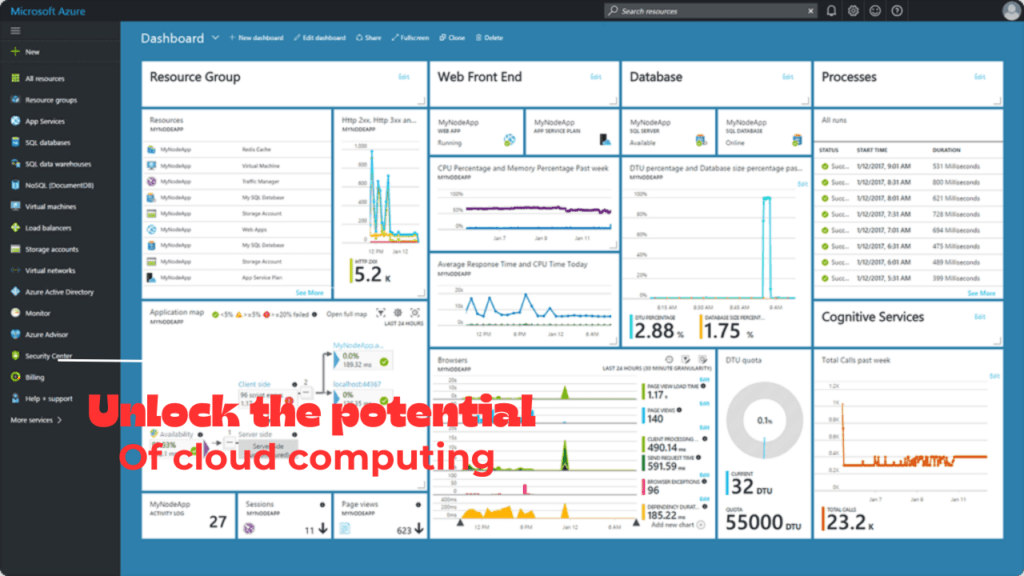
Microsoft Technologies for Web Application Development
Microsoft offers a variety of technologies that can be used to develop web applications. Some of the most popular technologies are, ASP.NET, ASP.NET Core, Blazor, Microsoft Azure, Visual Studio, IIS (Internet Information Services), and Microsoft 365.
ASP.NET Core

ASP.NET Core is a free and open-source web framework that is popular for building modern web applications. ASP.NET Core is a lightweight, modular, and cross-platform version of ASP.NET. It can be used to build web applications that run on Windows, macOS, Linux, and Docker.
Evolution and History of ASP.NET Core:
ASP.NET, the predecessor, was launched in 2002 by Microsoft. ASP.NET Core is a rewrite of the ASP.NET framework. Launched in 2016, it was a complete redesign with a modular architecture. This modularity made it leaner and more scalable for complex applications.
Key job opportunities
- ASP.NET Core Developer
- Full-Stack Developer
- Cloud Developer
- Back-End Developer
- Web API
The average salary for an ASP.NET Core developer can vary depending on location and experience, but it typically falls within the range of $93,896 to $117,116 in the United States.
Blazor
A new framework called Blazor enables programmers to create interactive web user interfaces (UIs) with C# rather than JavaScript. This can be a great option for developers who are more familiar with C# and who want to avoid the complexity of JavaScript.
Evolution and History of Blazor :
Blazor started in 2018 as a server-side framework using C#. It then evolved to support WebAssembly for client-side execution, giving developers more flexibility. Recently, Blazor with .NET 8 has embraced static rendering for faster initial load and automatic interactivity modes. It’s expanding beyond the web with PWA, Blazor Hybrid, and even AR explorations.
Key job opportunities
Blazor job opportunities are on the rise, but because it’s a relatively new technology compared to established frameworks, Blazor has the potential to become a major player in web development, particularly to individuals who are already acquainted with the.NET framework.
How much do experts earn?
Blazor developer salaries can vary depending on location and experience, but typically range from around $49,000 for beginners to over $100,000 for experienced developers.

Microsoft Azure
Microsoft Azure is a cloud computing platform that offers a variety of services for building, deploying, and managing web applications. These services include virtual machines, storage, databases, and analytics.
Evolution and History of Microsoft Azure:
Microsoft Azure started in 2008 as Windows Azure, focused on Windows developers. In 2014, it rebranded as Microsoft Azure, embracing open source and becoming a broader cloud platform. Today, it offers a wide range of services for all kinds of developers.
Key job opportunities
Microsoft Azure is a leading cloud computing platform, and with that comes a booming job market.
- Azure Administrator
- Azure Developer
- Azure Architect
Other in-demand roles include DevOps Engineer, Security Engineer, and Data Engineer (all with “Azure” prefixed).
How much do experts earn?
In the US, Azure Developers can make an average of $132,148 per year [scholarhat.com].

Microsoft 365
Microsoft 365 is a suite of productivity tools that can be used to build web applications. These tools include SharePoint, which can be used to create collaborative web applications, and Power Apps, which can be used to create low-code web applications.
Evolution and History of Microsoft 365:
Microsoft 365 started as a subscription service for the familiar Office programs (Word, Excel, etc.) in 2010, adding cloud storage and hosted services. In 2017, it became a broader suite, including Windows and security features.
Key job opportunities
- Product development
- Sales and marketing
- Support
How much do experts earn?
The average salary for Microsoft 365 expertise in the US is approximately 24,500 USD.
Future of Microsoft Technologies

Microsoft technologies are likely to be at the forefront of innovation in areas like cloud computing, AI, and security. Their focus on user experience, security, and sustainability will influence the shape of technology in the years to come.






